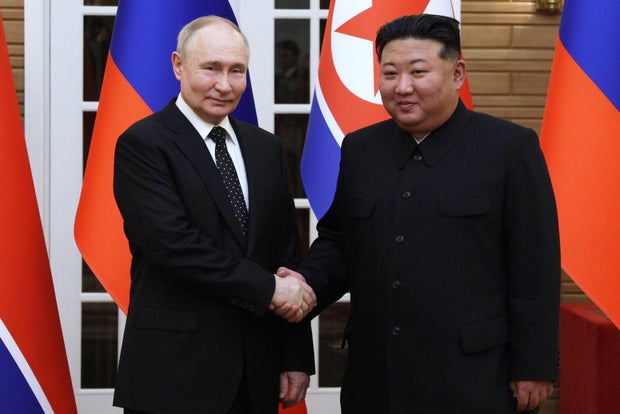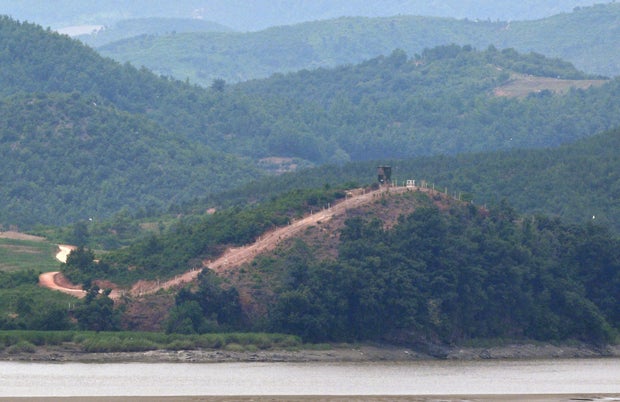Seoul, South Korea — South Korea summoned the Russian ambassador to protest Moscow’s new defense pact with North Korea on Friday, as tensions on the Koreas’ heavily fortified border continued to rise with vague threats from Pyongyang and brief, seemingly accidental incursions by North Korean troops.
On Friday, the powerful sister of North Korean leader Kim Jong Un issued a vague threat of retaliation after South Korean activists launched balloons carrying anti-Pyongyang propaganda leaflets across the border, and South Korea’s military said it had fired warning shots the day before to repel North Korean soldiers who briefly crossed the rivals’ land border into the third time this month.
This happened two days after Moscow and Pyongyang reached an agreement pact promising mutual defense assistance if any of them are attacked, and a day later Seoul responded saying it would consider supplying weapons to Ukraine to fight The invasion of Russia.
GAVRIIL GRIGOROV/POOL/AFP/Getty
South Korean Vice Foreign Minister Kim Hong Kyun summoned Russian Ambassador Georgy Zinoviev to protest the agreement between Russian President Vladimir Putin and Kim Jong Un and called on Moscow to immediately suspend its alleged military cooperation with Pyongyang.
Kim, the South Korean diplomat, stressed that any cooperation that directly or indirectly helps the North build its military capabilities would violate UN Security Council resolutions and pose a threat to the South’s security and warned of the consequences for relations from Seoul to Moscow.
Zinoviev responded that he would convey Seoul’s concerns to his superiors in Moscow, the ministry said. Reuters reports that Zinoviev said he told Kim that threats and blackmail against Moscow because of its growing ties with Pyongyang are unacceptable.
Leaflet campaigns by South Korean civil activists in recent weeks have led to the resumption of Cold War-style psychological warfare along the inter-Korean border.
JUNG YEON-JE/AFP via Getty Images
South Korean civil activists, led by North Korean defector Park Sang-hak, said they sent 20 balloons carrying 300,000 propaganda leaflets, 5,000 flash drives with South Korean pop songs and TV dramas, and 3,000 U.S. dollar bills. from the South Korean border town of Paju. on Thursday night.
Pyongyang resents such material and fears it could demoralize frontline troops and residents and eventually weaken Kim Jong Un’s grip on power, analysts say.
In a statement released by North Korea’s official Korean Central News Agency, Kim Yo Jong, one of her brother’s top foreign policy officials, called the activists “defector scum” and issued what appeared to be a threat of retaliation. .
“When you do something you were clearly told not to do, it’s natural that you find yourself dealing with something you didn’t have to,” she said, without specifying what the North would do.
Following previous leaflets by South Korean activists, North Korea launched more than 1,000 balloons which dropped tons of rubbish in South Korea, breaking tiles and windows and causing other material damage. Kim Yo Jong previously suggested that balloons could become the North’s default response to leafleting, saying the North would respond by “spreading dozens of times more trash than is being spread on us.”
In response, South Korea resumed anti-North Korea propaganda broadcasts over military loudspeakers installed at the border for the first time in years, to which Kim Yo Jong, in a separate state media statement, warned that Seoul was “creating a prelude to a very dangerous situation.” situation.”
Tensions between the Koreas are at their highest point in years as Kim Jong Un accelerates his development of nuclear weapons and missiles and tries to strengthen his regional position, aligning himself with Putin in a standoff against the US-led West. .
South Korea, a growing arms exporter with a well-equipped military backed by the United States, says it is considering increasing support for Ukraine in response. Seoul has already provided humanitarian aid and other support by joining US-led economic sanctions against Moscow. But it did not supply ammunition directly, citing a long-standing policy of not supplying weapons to countries actively involved in conflicts.
Putin told reporters in Hanoi, Vietnam, on Thursday that supplying weapons to Ukraine would be “a very big mistake” and said South Korea “should not worry” about the new deal with North Korea if the South is not planning aggression against Pyongyang. .
South Korean Foreign Minister Cho Tae-yul on Friday held separate phone calls with U.S. Secretary of State Antony Blinken and Japanese Foreign Minister Yoko Kamikawa to discuss the new covenant. The diplomats agreed that the deal poses a serious threat to peace and stability in the region and promised to strengthen trilateral coordination to deal with challenges posed by the alignment between Moscow and Pyongyang, Cho’s ministry said in a statement.
North Korea is extremely sensitive to criticism of Kim’s authoritarian regime and efforts to reach its people with foreign news and other media.
In 2015, when South Korea restarted loudspeaker broadcasts for the first time in 11 years, North Korea fired artillery fire across the border, prompting South Korea to return fire, according to South Korean officials. No casualties were reported.
South Korea’s military said there were signs that North Korea was installing its own loudspeakers at the border, although they were not yet working.
In the latest border incident, South Korea’s Joint Chiefs of Staff said several North Korean soldiers involved in unspecified construction work briefly crossed the military demarcation line dividing the two countries at around 11 a.m. Thursday.
The South Korean military broadcast a warning and fired warning shots, after which the North Korean soldiers retreated. The joint chiefs did not immediately release further details, including why they were releasing the information a day late.
South Korea’s military says it believes recent border raids were unintentional as North Korean soldiers did not return fire and retreated after warning shots.
The South’s military watched as the North deployed large numbers of soldiers to front-line areas to build suspected anti-tank barriers, reinforce roads and lay mines in an apparent attempt to fortify its side of the border. Seoul believes the efforts are likely aimed at preventing North Korean civilians and soldiers from escaping to the South.
bol co
jogo de terror online
novela sbt ao vivo
wishlist
musica terra seca
taça png

























